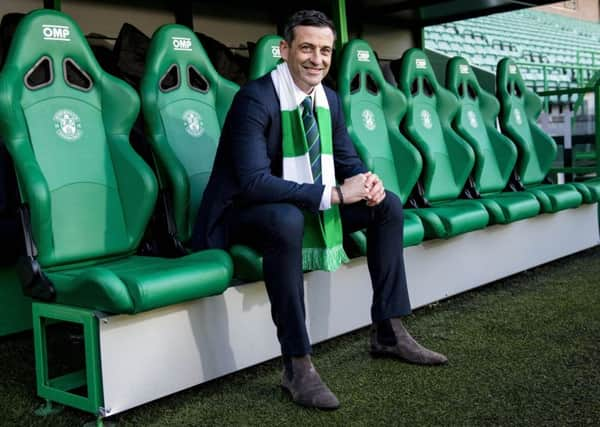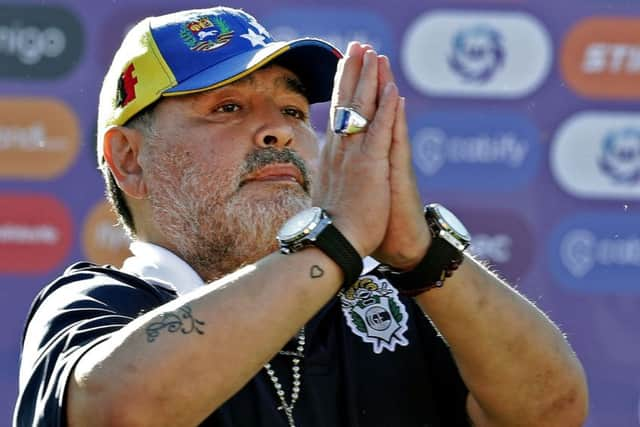Aidan Smith: Jack Ross is right to voice concerns about fly-on-the-wall documentaries at his club


Last week Jack Ross, pictured inset, returned to Scotland and to work, relieved to have left behind the all-seeing eye of Sunderland ’Til I Die. Again, intrusiveness and omnipresence were the problems, the new Hibernian manager being dismayed to find the reality TV red light for “ON” glimmering in his club car as he drove to training. How was this cramping his style? Was he suddenly too self-conscious to belt out his favourite blousy ballads from Celine Dion: the Ultimate Collection? Actually, the Rolling Stones might be more Ross’s bag. Did you spot the slip-on suede boots he wore to his Easter Road unveiling? Pure Brian Jones circa Their Satanic Majesties Request, so they were. The Leith home dugout doesn’t have a reputation for being Suave Man Central; if the new guy gets the Hibees playing with a flair to match, the locals will be pleased.
But we digress. If Ross and Pochettino are camera-shy, who is going to stride boldly into the spotlight? Who is going to validate the concept of having a fly on the dressing-room wall or in the liniment? Diego Armando Maradona, no less. The satanic majesty of Argentinian gambeta – the dribbling which involves keeping the ball close, dropping the shoulder, jerking the hips – doesn’t really do much striding any more, as the Netflix series Maradona in Mexico confirms. He waddles, sometimes with the aid of a stick or crutch. Meh-hee-co is not exactly a land of giants but Maradona’s arthritic knees seem to have reduced him to the point where he resembles a long-lost South American cousin of Jimmy Krankie.
Advertisement
Hide AdAdvertisement
Hide AdThis is just how he measures up, height-wise, to everyone else in the seven-parter about struggling second division team Dorados de Sinaloa. When he hobbles, though, the sun-baked ground shakes. Back in Buenos Aires the newscasters gasp: “Diego Maradona! In the home of the biggest drug cartel in Mexico!” They cannot believe it. Dorados presidente, Antonio Nunez, cannot believe it. “Before this, the biggest story out of Sinaloa was ‘El Chapo’ Guzman [before being banged up, the biggest drug trafficker in the world], we cannot help that he was born here but we won’t be judged any more by what this man has done. New stories can transcend, get us to a better place.”


Well, that kind of puts the Sunderland docusoap in perspective. Makes it seem like small corona. A so-called sleeping giant of a club trying to rouse itself for the umpteenth time. Wake me up when it’s finished. And I might have been similarly underwhelmed by Made in Tottenham if that one had simply been the story of a semi-successful club continuing on their semi-successful way, playing such pretty football that no one felt able to question why all-round good-guy Poch couldn’t actually win them anything.
But Jose Mourinho changes the narrative. If this was a drama and one of the writers had suggested the intervention of the Portuguese controversialist, everyone else in the room would have laughed. “Bringing in Mourinho would be like bringing back Bobby Ewing in Dallas,” someone might have said. “Too far-fetched. No one will believe it.” But, dream or nightmare, more will watch this series now.
Maradona at large in Mexico’s drug capital, given his cocaine addiction and combustible personality, seems equally improbable to a local radio phone-in: “It feels like we’ve put a diabetic in a candy shop. All everyone will talk about will be the drugs.” Well, the man gets the city of Culiacan talking about football. The team start winning and climbing the table. “I want to improve football,” Maradona says at one point. “But I’m not perfect – nobody is.” Almost spherical in his bright yellow shirt, he tells he bedraggled charges: “I come to give you my heart.”
There are bumps and scrapes, as you knew there would be. He squabbles with a rival coach, telling him: “Do you know how many games I played? And you, they don’t even know your name in your home town.” There should have been more games. Back in reflective mode, Maradona says: “I wonder what kind of player I could have been if I hadn’t taken drugs.” He’s asked about the most difficult aspect of being Maradona. “Being surrounded by people all the time. When I had my problems with drugs I can assure you I was the loneliest man on earth.”
Reality TV needs larger-than-life characters or gasping drama, usually both. Maradona, with his giant spare tyre, amply provides in the former category. Mourinho would claim equal status with him and I suppose while Spurs fans will watch Made in Tottenham if he manages to turn them into winners, those without a vested interest will ghoulishly hope for another big blow-out from him.
Are these football docs a good thing? Since Graham Taylor declared “Do I not like that”, and since Peter Reid, when he was Sunderland’s manager, swore 19 times in 45 seconds, they’ve lost their power to amaze. Nevertheless they still have a value. Club TV has rendered a lot of football chatter anodyne. The dedicated channels are full of outcisive outerviewing of managers and players who’re preaching to the converted in any case.
While he had serious reservations about the docs before he was cut out of his one, Pochettino searched for the good in them. “The most important [thing] is to live the reality,” he said, “and not to try to generate something that is fake or not real.”
Advertisement
Hide AdAdvertisement
Hide AdHe’s right about that. Docusoaps in other spheres suffer from the subjects being too camera-conscious. Maradona may have been alluding to this when, on the Dorados team bus, he serenaded his charges. You were reminded of the Aborigines’ fear of the camera when he sang: “My soul wilted away.”